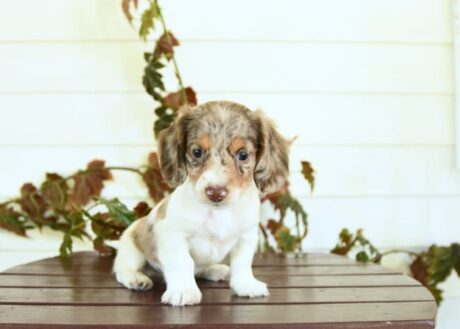Golden Dachshund: The Ultimate Guide to the Adorable Hybrid Breed
The Golden Dachshund, also known as the Golden Weenie, is a delightful hybrid breed that combines the best traits of the Golden Retriever and the Dachshund. This unique mix results in a dog that is not only visually appealing but also boasts a charming personality and a high level of intelligence. This comprehensive guide delves into everything you need to know about the Golden Dachshund, from their physical characteristics to their temperament and care requirements.
Origin and History
The Dachshund Legacy
The Dachshund, originating from Germany, was initially bred for hunting badgers. Dachshunds are fearless and tenacious, known for their long bodies and short legs. Their keen sense of smell and courageous nature made them excellent hunters.
The Golden Retriever Heritage
Golden Retrievers were developed in Scotland in the mid-19th century as gundogs to retrieve games during hunting expeditions. They are known for their friendly disposition, intelligence, and striking golden coats.
The Emergence of the Golden Dachshund
The golden Dachshund is a relatively new hybrid that has gained popularity over the past few decades. This breed combines the Dachshund’s playful and adventurous spirit with the golden retriever’s gentle and friendly nature, resulting in an endearing companion.
Physical Characteristics
Size and Weight
Golden Dachshunds can vary significantly in size, typically standing between 10 and 23 inches tall at the shoulder. Depending on which parent breed they take after, their weight can range from 30 to 60 pounds.
Coat and Colors
Their coats can be short or medium, often silky and smooth. Depending on the genetic influence of the Dachshund’s parent, the colour palette includes shades of golden, cream, and even darker hues like red or black.
Distinctive Features
Golden Dachshunds inherit the long body and short legs of the Dachshund, combined with the expressive eyes and friendly face of the Golden Retriever. Their ears can be long and floppy, and their tails are often feathery.
Temperament and Personality
Affectionate and Friendly
Golden Dachshunds are known for their affectionate nature. They form strong bonds with their families and are particularly good with children. Their friendly disposition makes them excellent family pets.
Intelligent and Trainable
This hybrid breed is brilliant, thanks to the cognitive prowess of both parent breeds. Quick learners and trained easily with positive reinforcement techniques. Their eagerness to please makes training a rewarding experience.
Energetic and Playful
Golden Dachshunds have a moderate to high energy level. They enjoy playtime and need regular exercise to stay healthy and happy. Activities like fetching, walking, and agility training are perfect for this energetic breed.
Health and Lifespan
Common Health Issues
Like all breeds, golden dachshunds are prone to specific health issues. Some common concerns include hip dysplasia, intervertebral disc disease (IVDD), and eye conditions. Regular veterinary check-ups are crucial to maintaining their health.
Lifespan
The average lifespan of a golden dachshund is 10 to 14 years. They can enjoy a long and fulfilling life with proper care, a healthy diet, and regular exercise.
Grooming and Care
Coat Maintenance
Regular grooming is essential to keeping the golden Dachshund’s coat in top condition. Brushing a few times a week will help prevent matting and reduce shedding. Depending on their activity level and coat type, bathing should be done as needed.
Dental Care
Dental hygiene is crucial for preventing dental diseases. Brushing their teeth several times a week and providing dental chews can help maintain good oral health.
Exercise Needs
Golden Dachshunds require regular exercise to keep them physically and mentally stimulated. Daily walks, play sessions, and interactive toys can help meet their exercise needs and prevent boredom.
Training and Socialization
Early Socialization
Early socialization is vital for Golden Dachshunds to develop into well-rounded dogs. Exposure to various environments, people, and other animals at a young age can help them grow into confident and friendly adults.
Obedience Training
Basic obedience training is essential for establishing good behaviour. Commands like sit, stay, come, and heel should be taught early on. Consistency and positive reinforcement are critical to successful training.
Advanced Training
Golden Dachshunds can excel in advanced training and dog sports like agility, obedience competitions, and scent work. Their intelligence and eagerness to learn make them great candidates for these activities.
Feeding and Nutrition
Dietary Requirements
A balanced diet is crucial for the health and well-being of Golden Dachshunds. High-quality commercial dog food that meets their nutritional needs is recommended. Consult with a veterinarian to determine the appropriate portion sizes and feeding schedule.
Treats and Supplements
Treats can be used as rewards during training but should be given in moderation to prevent weight gain. Supplements like omega-3 fatty acids can support coat health, while joint supplements can help maintain mobility, especially in older dogs.
Living Arrangements
Adaptability
Golden Dachshunds are adaptable and can thrive in various living environments, from apartments to houses with yards. However, they do best in homes with plenty of attention and exercise.
Companionship Needs
This breed thrives on human companionship and should not be left alone for long periods. They enjoy being part of family activities and will often follow their owners from room to room.
Safe Spaces
It is essential to provide a safe and comfortable space for rest. A cosy bed and access to a crate can give them a sense of security and a place to retreat when needed.
Adoption and Breeders
Finding a Reputable Breeder
When looking to adopt a Golden Dachshund, it’s crucial to find a reputable breeder who prioritizes the health and well-being of their dogs. Research and ask for references to ensure ethical breeding practices.
Rescue Organizations
Consider adopting rescue organizations specializing in Golden Retrievers, Dachshunds, or hybrid breeds. These organizations often have dogs in need of loving homes.
Adoption Process
The adoption process typically involves an application, home visit, and adoption fee. This process ensures that the dog is placed in a suitable home where they will be well cared for.
Conclusion
The golden Dachshund is a beautiful addition to any family, combining the best qualities of the golden retriever and the Dachshund. With their affectionate nature, intelligence, and playful spirit, they make loyal and loving companions. Proper care, training, and socialization will help them thrive and enjoy a healthy life.









